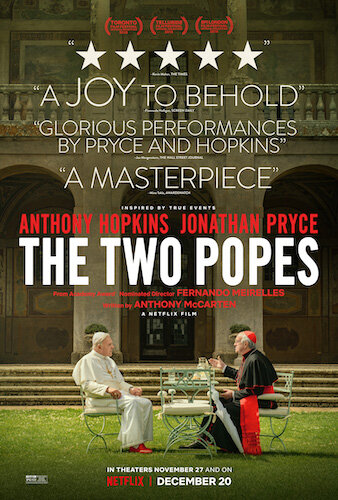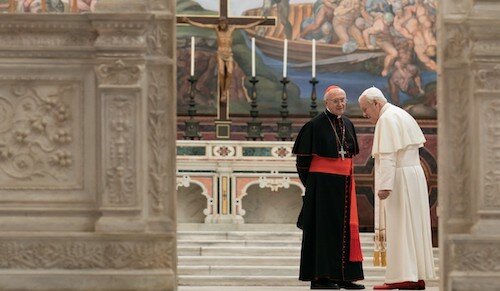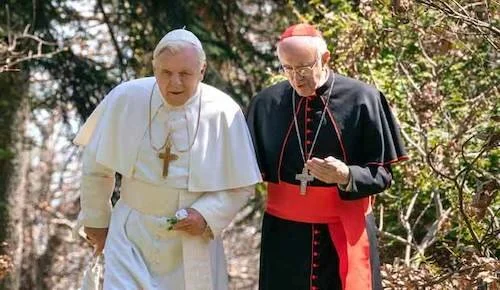The Two Popes
On paper, The Two Popes seems to be 2019’s super-safe feel-good biopic meant to cause a stir during the awards season. What do you know? It got nominated for four Golden Globes! That must be what’s going on. On the contrary, this could have been the case. Under the supervision of director Fernando Meirelles, The Two Popes is a little more daring. It may not step outside of its comfort zone too much, but there is enough going on here to make this tale far more interesting than a filmmaker willing to rely on the strength of the two lead actors. We all know the story of how Cardinal Jorge Bergoglio became Pope Francis after the resignation of Pope Benedict XVI (for a multitude of reasons), but Meirelles’ film turns this decision into a magnetic series of discussion sessions.
Jonathan Pryce (Bergoglio) and Anthony Hopkins (Benedict XVI) pull off some acting balancing acts to command this acting vehicle. Both speak multiple languages (with ease, as they dip in between multiple languages so naturally), keeping up with Meirelles’ fascination with the art of words. Meirelles confidently places footage of the real figures of papacy at the end of the film, in between the credits footage of Pryce and Hopkins acting still. In other films, this may be a bit of a daring tall order. After the seamless work by both acting veterans, the illusion is now complete. Placing real footage will not throw you off at this point.
Benedit XVI’s self doubts are being tended to by Bergoglio, in the former’s final days of being Pope.
With the (purposefully) shaky camerawork, and the intercutting of occasional real documented footage, The Two Popes feels like a conversation or two that we have crashed in on. When Bergoglio reflects on his past (as a means of discussing why he would not be a worthy Pope either), we are blessed with one of two artistic decisions. The first is shooting scenes in a different way: some of Bergoglio’s memories have a squashed aspect ratio, are shot in black-and-white, and are much more crisp and stoic than even the modern day scenes. Either this, or grainy news clips are tossed in, to detail the political turmoil that Bergoglio experienced during the coup d’état of Argentina in 1976 (if these aren’t actual news clips, then Meirelles and company sure fooled me).
Meirelles loves working with bold editors, and the slicing-and-dicing by Fernando Stutz is impactful here. Despite being highly constant (which may be strange for a film about two religious figures talking business and life), you feel the uneasiness between an anxious pope, and a conflicted cardinal. Both men don’t see eye-to-eye on everything, but they are mutually trying to fulfil God’s work in their own ways. The editing manages to convey this slight tension better than overacting or melodramatic dialogue could ever do. It’s a nice touch in a film that needed that slight oomph, without lionizing the content.
Hopkins and Pryce are identical with their subjects throughout The Two Popes.
This leaves the stage open for Pryce and Hopkins, who can be delicate or complex in any way they see fit. Rarely do either men raise their voices, but all of their emotions can be read on their faces. It’s funny, because it’s exactly these two actors that I constantly hope get better work. You’re talking about Hannibal Lecter and Sam Lowry: two of the best performances of yesteryear. Despite their many efforts, both Welsh greats have been misused for years. Here was their big chance, and they nailed it: Pryce as the unsure next-pope-in-line, and Hopkins as a leader full of many regrets. Pryce’s eyes dart around in anticipation and confusion. Hopkins’ eyes stare off in the distance as he ponders out loud. I know this seems like an Oscar baited film, with an easy subject and a crowd pleasing duo. Do yourself a favour and stream The Two Popes if you can. It’s much more interesting than I expected. It’s challenging enough to spice up a film that could have been a bore, and it’s not too challenging to alienate many intrigued viewers.
Andreas Babiolakis has a Masters degree in Film and Photography Preservation and Collections Management from Ryerson University, as well as a Bachelors degree in Cinema Studies from York University. His favourite times of year are the Criterion Collection flash sales and the annual Toronto International Film Festival.






